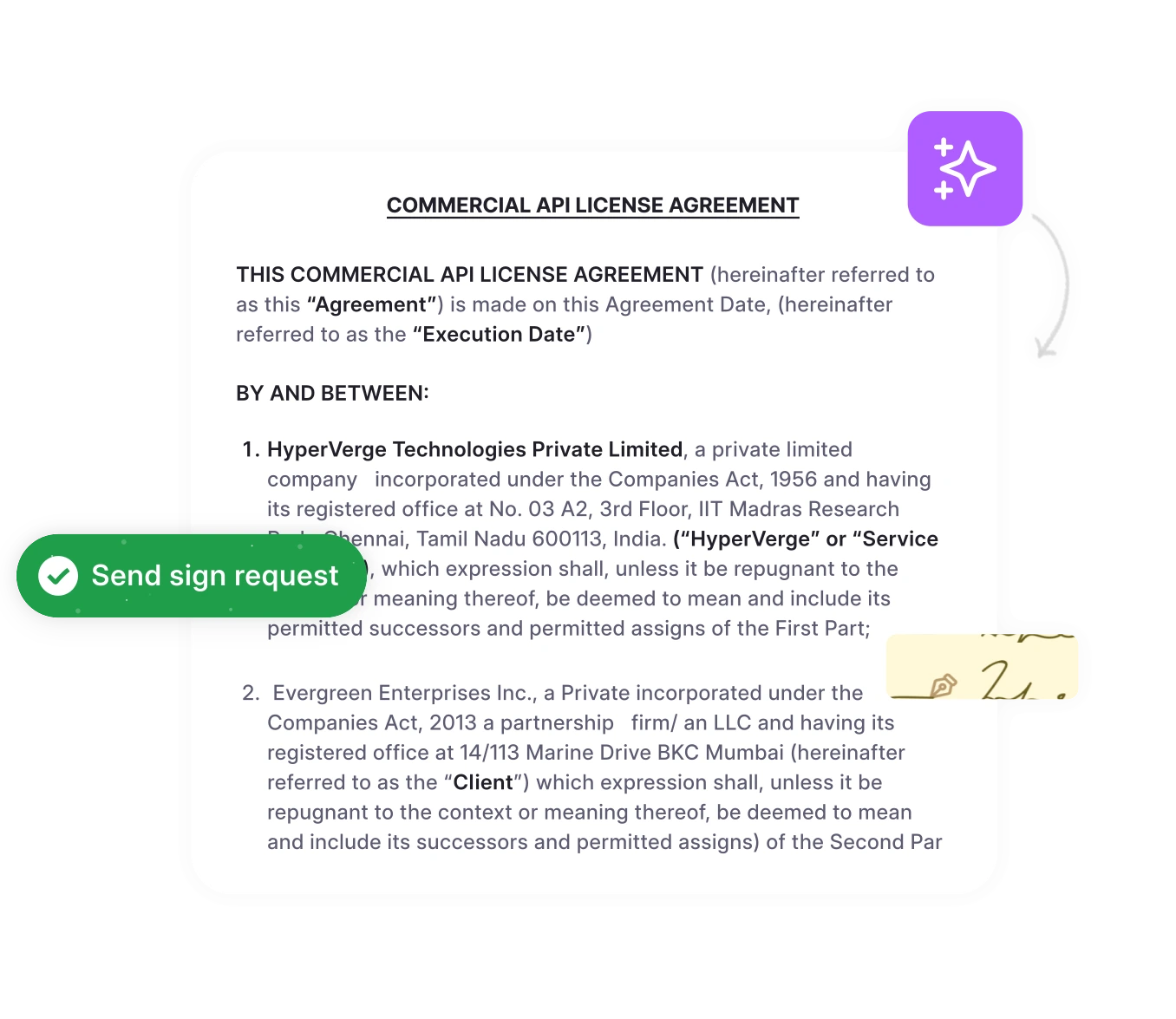Contractual capacity isn’t legal trivia—it’s foundational. It makes sure that the persons entering a contract can stand up in court.
In this piece, we’ll break down what contractual capacity means, who’s at risk of lacking it, and how to identify and mitigate capacity issues.
And yes, we’ll cover how innovative contract management platforms can make your life significantly easier.
What is contractual capacity?
Contractual capacity is the legal ability of a person or an organization to enter into a legally binding contract. It means that the party must be legally capable of understanding the terms and consequences of a contract and be bound by its obligations.
To understand how capacity fits within the essentials, review the six fundamental elements of a contract.
This comes down to a few key requirements:
- Of legal age (usually the age of majority, 18)
- Mentally competent – meaning you have the mental capacity to understand what you’re signing and the consequences
- Authorized to represent the business – you have the proper authority if you’re signing for a company, not just for yourself.
This authority comes from:
- Board resolutions delegating signing power
- Written delegation from the directors
- Clearly defined roles in corporate bylaws
- Power of attorney for specific transactions
If even one of these pieces is missing, the agreement might not be legally binding. The law recognizes this to protect individuals and businesses from getting trapped in contracts they never fully understood or weren’t supposed to sign in the first place.
Sometimes, a lack of contractual capacity is apparent. Other times, it’s a grey area, like with certain mental illnesses or temporary situations that affect a person’s ability to make clear decisions.
👉 Issue: Minor entering a contract.
👉 Summary: A minor entered into an employment contract and later tried to void it after being fired.
👉 Outcome: The court ruled the contract was voidable at the minor’s option.
📌 Why it’s useful: Reinforces that minors generally can’t be bound, but they can enforce or void contracts selectively – classic CLM risk.
In some instances where a person’s capacity is in doubt, the court’s decision hinges on whether there was a sufficient level of understanding to uphold the contract. The requirement is not complete comprehension, but rather an adequate grasp of the agreement.
Courts use several standardized tests to assess whether someone has contractual capacity:
Once we understand what contractual capacity means, it’s important to consider the implications, specifically, what occurs if a party lacks this essential requirement when agreeing.
What happens if contractual capacity is missing?
It’s easy to overlook contractual capacity until something goes sideways. However, when a person or business signs an agreement without the necessary legal authority, the consequences can be severe and swift.
First, any contract entered into by a person who lacks contractual capacity can be considered either voidable or, in some situations, deemed void right from the start.
Here’s what can happen if capacity is missing:
| Scenario | Business Impact |
| Void or Voidable Contracts | The contract can be challenged or thrown out, leaving both parties scrambling to renegotiate—or left with nothing at all. |
| Legal Disputes & Litigation | Lack of capacity is a common defense in lawsuits. If someone pushes back, your company could face costly, drawn-out legal battles. |
| Compliance Failures | In industries such as finance, healthcare, or government, a contract signed by someone without proper authority can violate the rules, resulting in fines or audits. |
| Operational Disruption | Projects built on a shaky contract can stall or collapse. Teams may have to redo work, delay launches, or renegotiate under pressure. |
| Reputational Risk | One invalid contract can damage your reputation, especially if it exposes weak internal controls or trust with vendors and partners. |
Contracts made with individuals lacking mental capacity, whether due to mental illness or temporary incapacity, are often invalidated by courts, leaving the other party without protection.
Similarly, contracts signed by people without proper authority are a common issue in fast-growing or multi-jurisdictional companies. In fact, according to Deloitte, organizations lose on average 9.2% of their contract value due to mismanagement over the contract lifecycle. These agreements may stand for months or years before being challenged, creating uncertainty and risk for businesses that have already invested time, money, and resources.
Ignoring contractual capacity is a risky gamble that can cause deals to quickly unravel, leading to legal, operational, and financial complications in any type of contract.
Control who signs what
From access control to approval workflows to compliant execution. HyperStart handles it all.
Book a DemoBecause a lack of contractual capacity can lead to serious issues, legal teams must be able to identify and address these concerns to ensure contracts are valid and enforceable.
How can legal teams assess and enforce capacity?
Ensuring every contract signed is enforceable isn’t always as simple as checking a box. Legal teams face several recurring challenges when it comes to verifying contractual capacity and protecting their organizations. Here are the 5 biggest risks and the ways to tackle them:
1. Challenge: Signers don’t always have documented authority or legal capacity
👉Issue: An Unauthorized business representative signed the lease.
👉 Summary: A real estate agent signed a commercial lease without being explicitly authorized. The company later refused to honor the lease.
📌 Outcome: The lease was invalidated because the signer lacked actual or apparent authority.
Read more on Invalid Contracts.
It’s easy to assume everyone who signs a contract has the proper legal ability, but in reality, authority is often unclear or undocumented. This can lead to contracts being signed without the right permissions, creating risk for both parties involved.
How to tackle it:
Establish clear internal rules and digital workflows that require signers to demonstrate their legal capacity and ability to contract before any finalization. Use contract automation for approval routing, manager sign-off, or built-in permissions checks within your contract management platform. When the process requires everyone to demonstrate their authority up front, contracts are less likely to be challenged or voided.
2. Challenge: Auditing authority after the fact is time-consuming and unreliable
Trying to confirm who had proper authority after a contract is signed can be a logistical nightmare, especially if records are scattered across emails or spreadsheets.
How to tackle it:
Adopt digital tools that automatically log each contract signed, capturing who signed, when, and under what legal capacity. Contract audit trails are essential for compliance and dispute resolution. Look for platforms with tamper-proof audit trails, so you have lasting proof of capacity to contract and proper authority if the contract’s terms are ever questioned.
3. Challenge: Different rules in different regions
Legal teams working across multiple jurisdictions have to juggle varying standards for contractual capacity, like the age of majority, mental capacity, or the specific legal ability required in each location.
How to tackle it:
Standardize your contract workflows to include checks for all local requirements—age, authority, and mental competence. Use digital checklists or smart forms to prompt for these details every time, so every binding agreement meets the legal standards wherever business is done.
4. Challenge: Roles change mid-process
A signer might have authority at the start of negotiations but lose it before the contract is executed, due to role changes, leaving the company, or restructuring. This puts contractual capacity at risk and can make the contract voidable.
When that happens, consider using a contract amendment or addendum to clarify authority and terms before proceeding.
How to tackle it:
Don’t just check capacity at the beginning. Always verify, at the exact moment of signing, that the signer still has the necessary capacity and legal ability. Automated reminders or last-minute verification steps in your contract process can help keep every contract valid and legally binding.
Despite thorough assessment and enforcement, legal teams often face common myths and mistakes surrounding contractual capacity.
5. Challenge: Contracts signed under intoxication
👉Issue: Capacity affected by intoxication and mental illness.
👉Summary: A man with a known bipolar disorder and alcohol addiction signed a property agreement under an unclear mental state.
👉Outcome: The court upheld the contract because he understood the agreement’s basic terms at the time.
📌 Why it’s useful: Shows that mental illness or intoxication alone doesn’t void a contract unless the person lacked comprehension — supports your point about grey areas.
Not all intoxication voids contracts. Courts generally rule that voluntary intoxication shouldn’t excuse contractual obligations. However, if someone was severely impaired and couldn’t understand the agreement’s nature, AND the other party knew about the intoxication, the contract may be voidable.
How to tackle it:
Document the signing environment and ensure all parties appear mentally present and capable during contract execution. If there’s any doubt about a signer’s state, postpone signing until they’re competent.
What are the common myths & mistakes about contractual capacity?
There are several misconceptions about who has the legal ability to enter into contracts, leading to common mistakes about contractual capacity. Here is a list of 5 common mistakes organizations make regarding contractual capacity.
1. Not everybody can sign
A common mistake is assuming that anyone with a company email or business card has the legal ability to sign contracts. In reality, the proper authority is what matters. Contracts signed by people lacking the capacity to contract may not be valid, and this oversight can result in a voidable contract that doesn’t hold up when challenged.
Not all individuals within a company should be considered fully capacitated of signing contracts on behalf of the business. This is the reason why articles of association and other legal documents that sustain the business should clearly specify who has the authority to sign contracts.
2. Once it’s signed, it’s final
Many believe that a contract becomes automatically legally binding once it is signed. However, if a person lacks contractual capacity, whether due to mental incapacity, being under the legal age, or exceeding their signing limits, the agreement can often be deemed void or subject to legal challenge. A binding agreement only exists when all parties involved have the capacity to contract.
👉Case Law Evidence: The Massachusetts Supreme Judicial Court case Sparrow v. Demonico demonstrates how complex capacity issues can be, where the court examined whether a party could establish that she could not contract, thus making the contract voidable by her.
3. Forgetting capacity can change
Another pitfall is treating capacity as a box to check at the start of contract negotiations. People change roles, leave the company, or experience shifts in their mental ability over time. Not confirming the signer’s contractual capacity at the exact moment of signing contracts puts your business at risk, especially for high-stakes deals.
Capacity rules often require a person to have reached a minimum age and to be of sound mind. This highlights that capacity is not a static condition but must be assessed at the time of contract execution.
4. Assuming “business as usual” is safe
Just because most contracts in your industry or region work a certain way doesn’t mean all agreements are protected. Laws about the age of majority, mental capacity, and corporate authority can differ. Ignoring these details, or not adapting your process when entering new markets, can leave contracts legally exposed.
5. Overlooking edge cases
Some contracts fall apart because one party had a history of certain mental illnesses or was subject to a court order that limited their capacity. These situations can easily negate contractual capacity, and what looked like a straightforward agreement might be unenforceable.
6. Ignoring industry-specific capacity rules
Different industries have unique capacity requirements. Healthcare contracts must comply with HIPAA when involving patient data. Financial services have additional capacity verification requirements. GDPR affects data processing contracts in Europe. Ignoring these sector-specific rules can void contracts even when general capacity seems sufficient.
Understanding these common myths and mistakes highlights just how easily contractual capacity risks can arise; this is where HyperStart steps in to help organizations prevent such issues before they impact agreements.
Secure contract approvals
Safe role-based access to only approvers, signers, and stakeholders. Keep everyone else out.
Book a DemoHow Hyperstart Helps Prevent Contractual Capacity Risks
HyperStart is a contract management platform that addresses these capacity issues head-on with automated workflows and built-in safeguards.
1. Route contracts through authorized approvers
HyperStart’s role-based access controls ensure contracts only reach individuals with verified authority. Our system routes agreements with no-code approval workflows based on their role, deal size, and signing limits. This prevents unauthorized signatures while keeping your approval process moving smoothly.
2. eIDAS & UETA compliant eSignatures
HyperStart meets eIDAS and UETA compliance standards, ensuring your contracts are legally binding and enforceable. Our compliant e-signature technology provides the legal protection you need while maintaining the security of role-based access controls.
3. Capture every action in a secure audit trail
Every step of the approval workflow is logged with time stamps so you have a tamper-proof record for every contract. If there’s ever a question about whether the right person signed, you’ll have the audit trail to prove their legal ability and proper authority.
4. In-Flight dashboard
Lastly, HyperStart’s contract management dashboards keep both legal and operations teams informed about potential issues. You can identify signatory bottlenecks, approval delays, or mismatches in authority across all contracts as they occur, making it easy to address capacity risks before they become significant problems.
Parting thoughts
Contractual capacity isn’t just a legal technicality—it’s a business-critical requirement that can make or break your agreements. The combination of unclear signing authority and non-compliant signatures creates unnecessary risk that can void contracts and disrupt operations.
HyperStart eliminates these risks with three powerful features: secure role-based access controls that ensure only authorized personnel can sign, audit trails, an inflight dashboard, and eIDAS & UETA compliant e-signatures that guarantee legal enforceability. Together, these features create an ironclad contract process that protects your business from start to finish.











